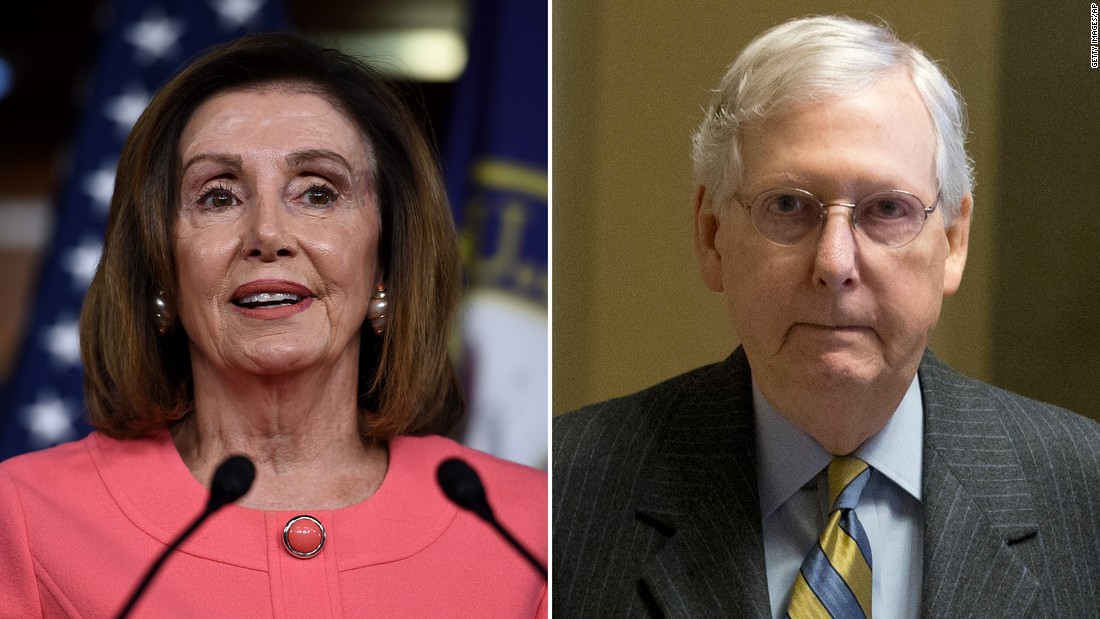[ad_1]
“We’re obviously out of session this week, but when my members come back next week we’ll start socializing it with them, begin to discuss it with the Democrats and start the legislative process,” Senate Majority Leader Mitch McConnell said in Corbin, Kentucky, on Monday. “I think you can anticipate this coming to a head sometime within the next three weeks, beginning next week.”
The GOP measure, which is actively being discussed by McConnell, White House officials, Treasury Secretary Steven Mnuchin and key Senate GOP chairmen, is expected to provide aid to businesses, hospitals and schools in an effort to jumpstart the economy with millions still out of work. But even before it’s introduced, it is already prompted an outcry from Democrats, who contend the measure is far smaller in scope than what’s needed and is expected to include measures their party won’t accept.
On Monday, McConnell reiterated his call for lawsuit protections for “everyone related to the coronavirus” — whether it’s doctors, nurses, businesses, K-12 schools and colleges — covering the period from December 2019 to December 2024.
“It must have, must, no bill will pass the Senate without, liability protection for everyone related to the coronavirus,” McConnell told Kentucky reporters. “Nobody should have to face an epidemic of lawsuits on the heels of the pandemic that we already have related to the coronavirus.”
Democratic leaders have already suggested such a plan is a sticking point.
“Let’s hear what everybody has to say,” House Speaker Nancy Pelosi said last week. “But don’t say, ‘You all have to go back to work even if it isn’t safe. And by the way, we are removing all responsibility from the employer.’ I mean, that is just — no.”
Pelosi instead called for a regulation under the federal Occupational Safety and Health Administration aimed at protecting workers at risk of exposure from the virus, an idea that has previously been rejected by Republicans.
And as the White House has demanded schools reopen in the fall, Republicans are discussing making new federal aid contingent on steps school districts are taking to reopen. GOP sources said Monday that the language was still being sorted out, and the details weren’t final on how that would work. But they are looking at a range of possibilities, including withholding money for schools that remain closed.
“As I said, I think the President would be willing to consider additional funds if all these schools reopen,” White House economic adviser Larry Kudlow told Fox News on Monday.
Democrats have pushed back at the idea.
“You just have to randomly open schools and take your chances or you’re not going to get any state aid? I mean that’s an absolutely no,” Washington Sen. Patty Murray, the top Democrat on the Senate Health, Education, Labor and Pensions Committee told CNN last week.
Plus the two sides are far apart about how much stimulus is actually needed for the economy.
“We must extend the unemployment insurance,” Pelosi said over the weekend. “It will expire at the end of July. And then there are direct payments to people so that we have $6,000 for a family of five. People are desperately in need it.”
Republicans have been wary of extending the $600 unemployment insurance provision, warning that the additional money could be a disincentive for people seeking work.
Republican Sen. Tim Scott of South Carolina reiterated his opposition to the extension on Monday.
“I wasn’t for it last time. I’m not for it this time,” he said of the enhanced jobless benefits.
When asked about it last month, House Minority Leader Kevin McCarthy said he doesn’t think “it’s productive to extend the added money from the federal government.”
Top Republicans have expressed some openness to more direct payments, although with stricter limits on who will receive them.
“Going back to school presents the biggest risk for the spread of the coronavirus,” Pelosi said on CNN’s “State of the Union” Sunday of the administration’s push to reopen schools.
This story has been updated with additional developments Monday.
[ad_2]
Source link


